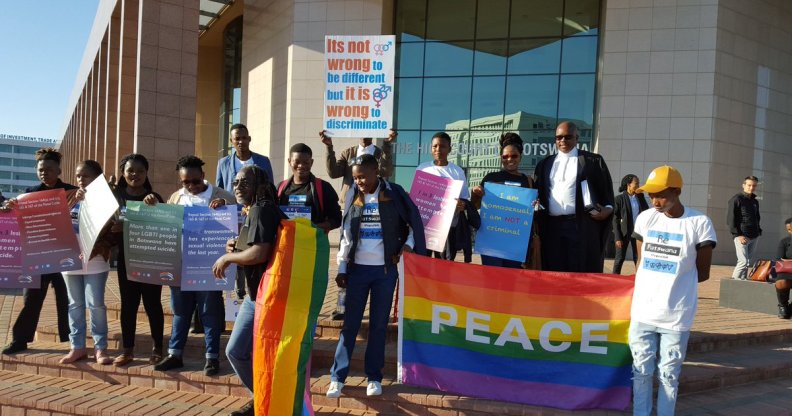Botswana decriminalises gay sex

Activists outside the High Court in Botswana on June 11. (Twitter)
The High Court in Botswana has announced its decision to scrap laws criminalising gay sex, in a landmark victory for African LGBT+ rights campaigners.
“Any discrimination against a member of society is discrimination against all,” the judges said, as they voted unanimously in favour of changing Section 164 of Botswana’s penal code, which punishes anal and oral sex by up to seven years in prison.
Repealing these laws effectively decriminalises homosexuality.
Judge Lebaru, reading out the judgment, said, “A democratic nation is one that embraces tolerance, diversity, and open mindedness… societal inclusion is central to ending poverty and fostering shared prosperity.”
Levaru added that is is “not in the public interest” to criminalise same-sex sexual conduct. “What compelling public interest is there necessitating such a law?” he said.
“Human dignity is harmed when minority groups are marginalised,” Lebaru said.
The challenge to the country’s penal code was made by an anonymous gay man, who is known only by the initials LM. In a written statement he told the High Court in March that “[The laws] limit me to interact with others who identify in the same way for fear of imprisonment.”
He added: ““We are not looking for people to agree with homosexuality but to be tolerant.”
The High Court in Gabarone postponed its ruling in March so that the law could be scrutinised by campaigners, but agreed to give its final verdict on June 11 after a one-day hearing.
Botswana’s anti-gay laws have been in place since 1965 and are a remnant of the country’s British colonial past. But the sub-Saharan country has become slowly more tolerant over the years.
In 2016, the country’s appeal court ruled that the government was wrong to refuse to register an organisation that represents LGBT+ people.
The judge’s verdict will be life-changing for Botswana’s LGBT community, particularly as it will allow them to access medical services without stigma. This is vital in what is one of the world’s most HIV-infected countries, with a 22.8 adult infection rate.
It’s a particularly significant decision after The High Court of Kenya ruled not to decriminalise gay sex on March 24.
The fact that Botswana has instead chosen to follow in the footsteps of its neighbour country Angola, which ruled to decriminalise on January 23, will be seen as a substantial victory for LGBT+ rights campaigners.

